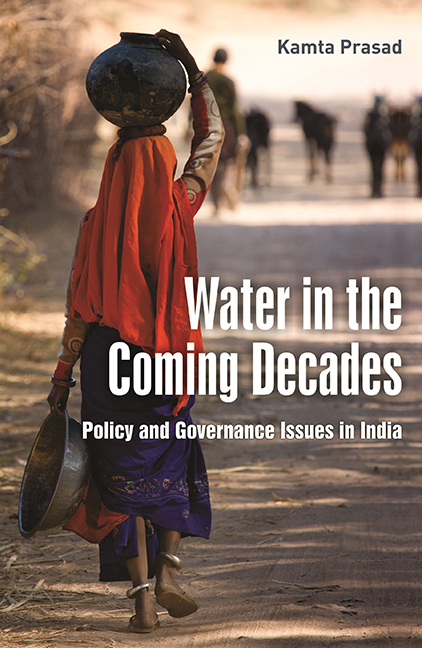Book contents
- Frontmatter
- Dedication
- Contents
- List of Tables
- List of Abbreviations
- Preface
- Acknowledgements
- Section I Overall Perspectives
- Section II Situational Analysis
- Section III Socio-economic, Institutional and Environmental Aspects
- Section IV Technological Options
- Section V Concluding Observations
- References
- Index
8 - Policy and Governance Issues in Hydropower Development
Published online by Cambridge University Press: 13 July 2022
- Frontmatter
- Dedication
- Contents
- List of Tables
- List of Abbreviations
- Preface
- Acknowledgements
- Section I Overall Perspectives
- Section II Situational Analysis
- Section III Socio-economic, Institutional and Environmental Aspects
- Section IV Technological Options
- Section V Concluding Observations
- References
- Index
Summary
This chapter examines the policy and governance issues related to the development of hydropower, which constitutes an important use of water in India. The discussion is confined to issues only up to the development of hydropower resources and not to its subsequent management involving its distribution and utilization by consumers since electricity generated from hydro plants becomes an inseparable and indistinguishable part of overall power including electricity generated from thermal plants. After examining the need for hydropower as well as the potential and status of its development, the chapter analyses reasons for its slow progress, which are found to be mostly related to policy and governance aspects. The chapter also highlights the progress of institutional reform including the entry of the private sector and looks into the options related to technological aspects.
Why hydropower?
Generation of power from water resources is considered so important that the National Water Policy, 2002, had given a very high priority to it, next only to drinking water and irrigation. Being a non-consumptive use of water, generation of hydropower, unlike irrigation and drinking water, has little impact on river regime. Unlike other sources of energy such as coal and petroleum, hydropower is a renewable and inexhaustible source of energy. Its importance would be obvious from Table 8.1, which gives an estimate of the stock of important energy resources in India along with the approximate time of exhaustion at their present rate of consumption.
In case of coal, the principal source of energy in India, there is an acute problem of demand outstripping supply. As a result, the import of coal has been rising. It increased from 11.76 mtoe (million tonnes of oil equivalent) in 2000–01 to 24.92 mtoe in 2006–07 and 54.00 mtoe in 2011–12. It is projected to rise to 90.00 mtoe by 2016–17 and 150 mtoe by 2021–22, indicating an import dependence of 18.8 per cent in 2011–12, 22.4 per cent in 2016–17 and 25.9 per cent in 2021–22. As of 2013, nearly $8 billion worth of coal is being imported annually. This was an important cause of the serious problem of the current account deficit in the balance of payment witnessed during 2013 with attendant consequences for the depreciation in the exchange rate of the rupee vis-à-vis the U.S. dollar and other currencies.
- Type
- Chapter
- Information
- Publisher: Foundation BooksPrint publication year: 2014



